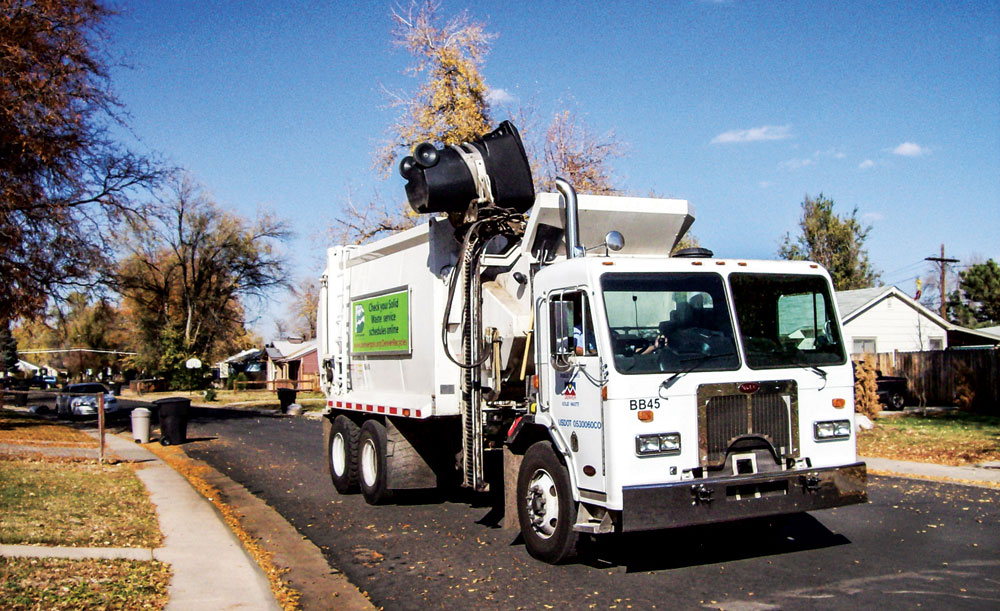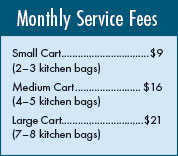
Pending approval from the city council, Denver will soon charge for trash removal. Photo courtesy of the City & County of Denver
By the end of the year, Denver residents will likely lose a time-honored tradition – free trash pick-up.
City environmental agencies are proposing a charge of $9 to $21 depending on the size of the cart. The proposal will likely go to the full city council in April. If approved, the new charge would start by the end of 2022.
The basic premise is to encourage people to recycle and compost by offering those services free while charging for trash removal, said Chief Climate Officer Grace Rink of the Office of Climate Action, Sustainability and Resiliency (CASR).
 “Customers will be able to choose cart sizes that work best for their household—small, medium, or large—and by putting more of their waste in the recycling and composting carts, many should be able to use the small trash cart,” Rink said.
“Customers will be able to choose cart sizes that work best for their household—small, medium, or large—and by putting more of their waste in the recycling and composting carts, many should be able to use the small trash cart,” Rink said.
The monthly service fee would be $9 for the smallest cart which holds two to three kitchen bags, $16 for a medium cart which holds four to five kitchen bags, and $21 for a large cart which holds seven to eight kitchen bags.
Rink says weekly recycling is something Denverites have wanted for a long time. Currently recycling is collected only every other week and compost is collected weekly for a monthly fee of $9.75. Special services such as the monthly extra trash/large item pickup day and the annual tree cycle and mulch giveaway program would still be offered for no additional charge.
Rink and other officials know well that residents have come to expect free trash/recycle pick up; the city began household recycling in the early 1990s for no fee. According to CASR, 74 percent of Denver’s waste goes to a landfill while only 26 percent is recycled and composted; the national average is 34 percent.
Under the new system, Denver could achieve a 50 percent recycling/compost rate within five years. With the current system, that would take 25 years, Rink said.
“We know the people of Denver care about the environment, and we can do so much better than a 26 percent recycling/compost rate,” Rink said. “Getting our food waste and yard debris out of the landfill is one of the quickest and lowest-cost ways to reduce the amount of methane we are putting into the atmosphere.
“If we can double the amount of waste we recycle and compost, we will cut in half the amount of greenhouse gas emissions our waste creates in the landfill.”
Not everyone’s so sure it’s a great idea. Shawn Schwab, who lives in northeast Park Hill, agrees that people need to make a bigger effort to reduce the amount of trash we produce and put into the landfills.
“And yes, charging people for this service is one way to accomplish that,” Schwab said. “I also see a lot of drawbacks to this approach beginning with people just putting their trash in their purple recycle bins.
“That defeats the recycling program because we know that when trash is found in recyclable materials, the entire lot of recyclables is then just tossed into the landfill.”
Schwab said he’s also concerned the new fee amounts to a double payment because the current service is already covered by property tax.
Rink says that the feedback they’ve received has been overwhelmingly positive but concerns like Schwab’s are not uncommon. The cost of trash removal is not fully covered by the property tax of their 180,000 customers; the cost of collection services is covered by the general fund which includes all residential property taxes, including residents who don’t receive the city’s collection services, property taxes from commercial properties that also don’t receive city collection services, and sales and use tax paid by everyone in Denver.
“We have to educate people on the benefits of sorting their waste properly and why it’s beneficial to get more of it into the composting and recycling cart,’’ she said.
There will have to be an enforcement mechanism in place at some point, Rink said.
“It’s not going to be in the first month. If people are getting it wrong, we’d like to work with them first. If the contamination goes on for a long time after we’ve done a bunch of outreach, then we might have to remove a cart from a customer,’’ she said.
“If that contaminated load goes into a truck, it contaminates the whole load which will cost the city over time. But we are going to do everything we can to work with customers before we take a cart away.”
Low-income households may qualify for an instant rebate affordability program managed by the Denver Department of Human Services. Eligibility will be based on the area median income (AMI) table which takes into account income plus the number of people in the household. For more information on the city’s waste programs, go to www.denvergov.org/My-Property/Recycling-Compost-and-Trash.



This is an attempt to circumvent Tabor. Current trash pickup is fully funded by taxes, which are collected and budgeted for trash pickup. What purpose will those fund be directed towards, if they no longer pay for trash. How/why is THAT not a tax increase?